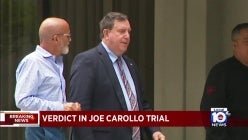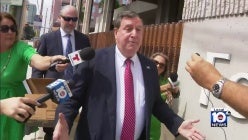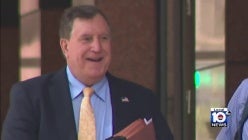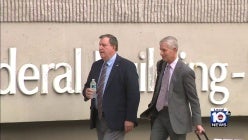Does this remind you of anyone or anything here in corrupt St. Johns County?
You tell me.
From WPLG:
Jury finds Miami Commissioner Joe Carollo liable in federal civil case, ordered to pay $63M
Jurors found he violated First Amendment rights of Little Havana businessmen






FORT LAUDERDALE, Fla. – After a marathon civil trial, a federal jury in Fort Lauderdale found Miami City Commissioner Joe Carollo liable in a civil case brought by two businessmen who accused him of retaliation — and they delivered a massive monetary verdict.
The decision, in which jurors found Carollo violated their First Amendment rights, came down Thursday morning. He was ordered to pay more than $60 million in damages.
The plaintiffs, businessmen Bill Fuller and Martin Pinilla, claimed that Carollo infringed on their free speech rights, alleging he used his office to harass them and damage their reputations, all because they supported his political opponent, Alfonso “Alfie” Leon, in 2017.
Attorneys for Fuller, who owns Ball and Chain, and Pinilla painted a picture throughout the trial of a commissioner who bullied anyone else who went against him.
Jurors ordered Carollo, who represents Miami’s District 3, to pay $8.6 million in compensatory damages and $25.7 million in punitive damages. They ordered him to pay Pinilla $7.3 million in compensatory damages and $21.9 million in punitive damages. That totals roughly $63.5 million in damages.
Carollo, wearing a face mask, showed no visible reaction as the verdict was read around 10 a.m.
Fuller and Pinilla, however, shed tears. The two were jubilant following the jury’s decision.
“Once and for all, it feels great to finally smush that cucaracha,” Fuller said in a news conference following the verdict.
Watch plaintiffs’ news conference:
Fuller called the verdict “a victory for the small people.”
“Not only was he a bully, but he was also a coward,” Fuller said. “We feel we have been vindicated here. This man has taken our name through the mud.”
Fuller added: “The small group of select individuals that he has worked with in the city of Miami, they’re also corrupt. And each and every one of them came up here over the last few days and lied and invented these stories to be able to support this man so they could protect their jobs. This is the way you empower bad people and dictators in our world to rise.”
Pinilla said what Carollo “has done to us, to our businesses, to our employees is wrong.”
“He does not deserve to be an elected official,” Pinilla said.
The plaintiffs’ attorneys called the decision a victory for the First Amendment.
“The message has been sent loud and clear,” attorney Courtney Caprio said. “Our elected officials cannot punish those who oppose them.”
Carollo and his attorneys had little reaction leaving the courthouse, citing a gag order that was lifted shortly after the trial ended.
Later, his attorneys released a statement on his behalf:
“Commissioner Carollo and his legal team thank the jury for their service. We are disappointed with the result. Commissioner Carollo will seek to exercise all legal rights available to him including appellate review.
Unlike the Plaintiffs who seem to have now resorted to disparaging comments about the Commissioner and City of Miami Employees, the Commissioner will continue to serve all citizens of District 3 and the City of Miami fairly and equally in protecting health, safety, and quality of life.”
Mason A. Pertnoy, Carollo's attorney
Fellow Miami Commissioner Alex Diaz de la Portilla also provided Local 10 News a statement, which read:
“A miscarriage of Justice that the 11th Circuit Court of Appeals will without a doubt correct.”
Throughout the trial, jurors listened to testimony from dozens of witnesses as attorneys for Fuller and Pinilla painted a picture of a commissioner who went too far, and worked to convince the jury that the commissioner was a man who would bully city staff and anyone else willing to go against him.
They showed clips from council meetings and pictures of Carollo making late-night visits to the Little Havana properties, claiming the commissioner was obsessed with destroying Fuller and Pinilla.
[RELATED: Taxpayers foot Carollo’s legal bills, so who will pay multi-million dollar award?]
But defense attorneys did their best to contradict the narrative, saying Carollo wasn’t fixated on the entrepreneurs and was instead working for the betterment of his district.
On Tuesday, defense attorneys for Carollo rested their case and closing arguments began Wednesday morning.
Over the more than 50-day trial, three jurors dropped out and Carollo racked up nearly $2 million in legal bills at the taxpayer’s expense.
Miami City Attorney Victoria Mendez said in a statement that the city was “disappointed with the verdict and certain issues that occurred during the trial” and “anticipates that Commissioner Carollo will be exercising (and should exercise) full appellate rights, as provided for and protected under the American judicial system.”
#ThisJustIn: “the City anticipates that Commissioner Carollo will be exercising (and should exercise) full appellate rights, as provided for and protected under the American judicial system.” -Victoria Méndez, @CityofMiami City Attorney More: https://t.co/aVsay8eNsI 1/ pic.twitter.com/1wQVfh10Td
— Christina Boomer Vazquez, M.S. (@CBoomerVazquez) June 1, 2023
Carollo’s fellow city commissioners reacted to the verdict Thursday.
Manolo Reyes, who represents District 4, said he is awaiting a briefing from the city attorney to unpack the jury’s findings and explore public money impacts as the city explores next steps.
District 2 Commissioner Sabina Covo also responded.
“Upholding the public’s trust is paramount and today’s verdict by a jury raises many questions,” she said in part in a statement to Local 10 News. “I look forward to receiving a detailed briefing by the city attorney and city manager on impacts and implications to our taxpayers.”
Legal analyst David Weinstein, who is not involved with the case, told Local 10 News that it is important to “keep in mind that (this case) still has a long way to go,” citing that there are still courts of appeals that are “going to review every single thing that happened during the course of this trial as well as things that happened before the trial even took place. So, it’s not over yet.”
The verdict will not affect Carollo’s standing as a commissioner.
“This is not a finding of guilt on a criminal violation. This is a finding of accountability that he was liable for having violated the First Amendment rights of the plaintiffs,” said Weinstein, adding that the decision in this particular case is not a qualifying conviction for which Carollo would be removed from office.
The trial started in Broward County, moved to Miami-Dade for a few weeks after record flooding, and then moved back to Broward.
Copyright 2023 by WPLG Local10.com - All rights reserved.
ABOUT THE AUTHORS:

Liane Morejon
Liane Morejon is an Emmy-winning reporter who joined the Local 10 News family in January 2010. Born and raised in Coral Gables, Liane has a unique perspective on covering news in her own backyard.

Chris Gothner
Chris Gothner joined the Local 10 News team in 2022 as a Digital Journalist.
Conversation
All Comments